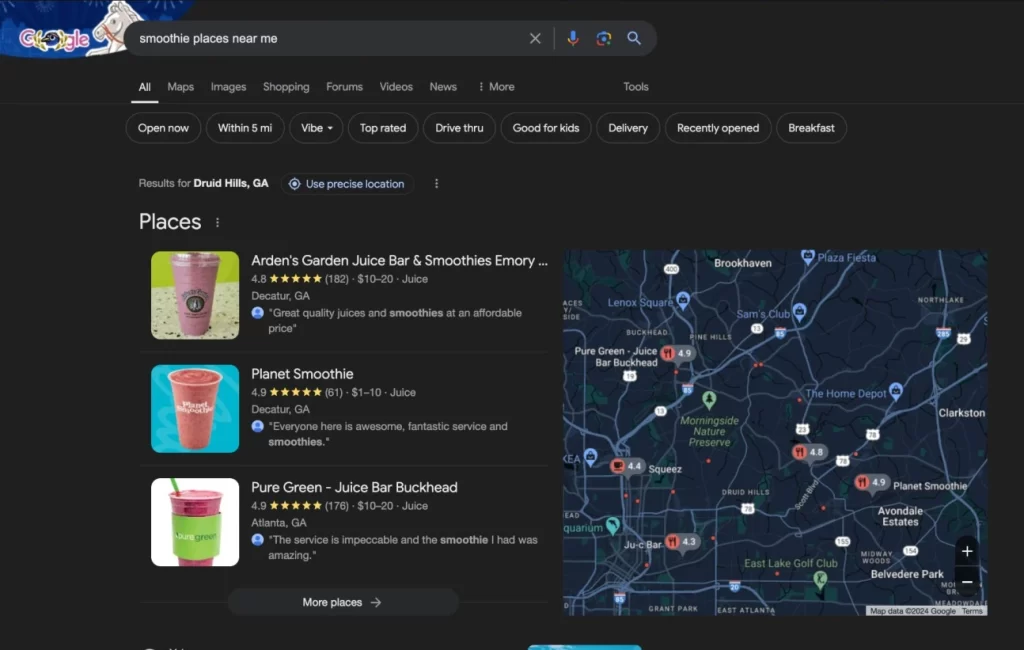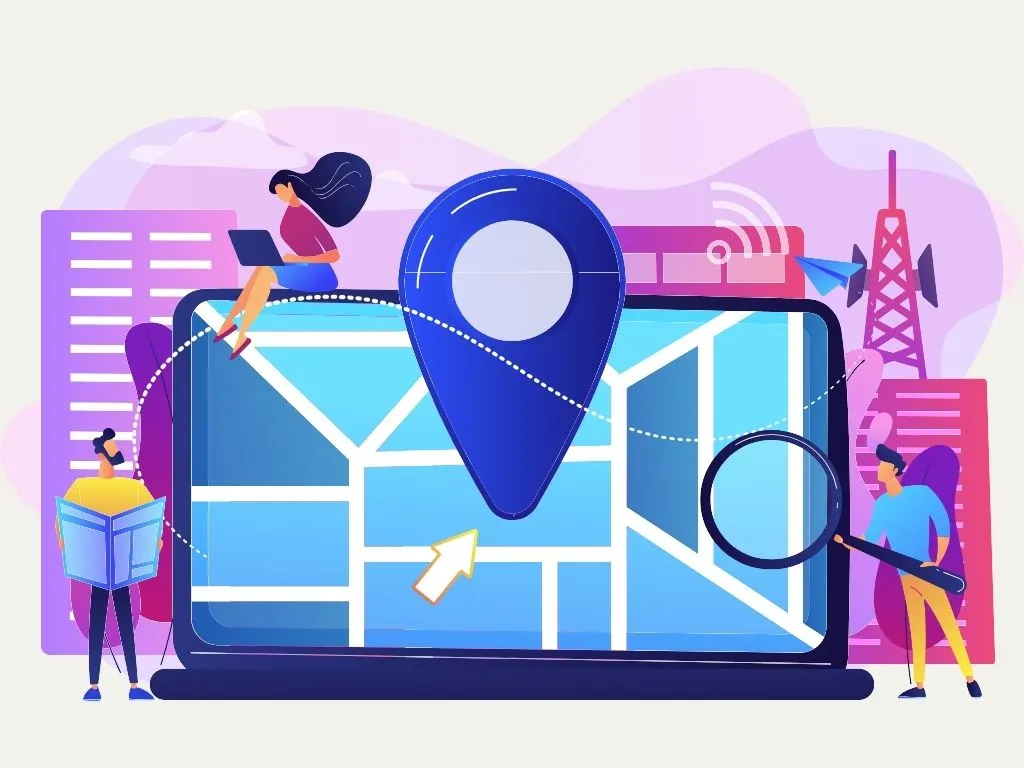To many, the term local SEO may just feel like an inconsequential buzzword. You hear it all the time, but it’s a foreign concept, and it seems unlikely that it actually matters. In fact, one of the very first questions a lot of business owners have in our discussions with them is, do I even need it?
That’s a question for which the answer varies from business to business. The way we like to answer it is with another very simple question. If you offer a service or product of value, and you want people in your area to know about it, you would be wise to invest resources into local SEO.
This can be especially relatable for small business owners hustling to get traction on their products. The statistics show that more than 40 percent of searches are to get information about local businesses or services.
Getting Started with Local SEO
Local SEO services for small businesses are a key part of marketing and hold the power to showcase the business in front of the right audience in the right place at the right time.
Search engines rely on signals including content, social media handles, links, and citations to provide the most relevant information to the user. Local SEO allows businesses to position their product or service in front of prospects searching for them. In this guide, we’ll explain what local SEO is, how it works, and tips to improve local SEO strategy. Making this article a must-read for SEO professionals and small businesses alike.
What is Local SEO?
Local SEO is a targeted optimization strategy designed to increase local businesses’ visibility for geographic-centered searches. In a report shared by Google, searches for “open now near me” have grown globally by 400%. This means that customers are actively searching for B&M locations to make a purchase.
Local SEO is an essential process for businesses focusing on increasing their traffic, leads, and brand awareness. To understand the importance of local SEO let’s look at some telling statistics.
More than 70% of users who search for something local on their phones will visit that location within the same day.
In more than 40% of search queries, consumers are looking for local information.
So it’s clear local SEO services for small businesses can have a huge impact in the digital marketing world. Attract in-store traffic, get online or phone orders, appointment bookings, store visits, and establish your business brand with local SEO services.
Who Benefits from Local SEO and Why?
Local SEO is based on a whole different algorithm, reliant on specific ranking factors. In order to raise local search visibility for multiple locations, you can perform a series of SEO actions. A few actions include:
- Optimizing Google business profile
- Website Optimization
- Citation Building
- Spam filtering
- Local link building
- Adapting to search engine changes
Doctors & medical practices, lawyers & law firms, SEO agencies, multi-location brands, event planners, service area businesses, and other local businesses can benefit from local SEO strategies.
How Search Engines Evolved

The purpose of search engines was to help users find the sites they were looking for on the web. In the early days of the internet, there were fewer businesses available online, which made navigating the web easier and it made geography less emphasized.
When typing a phrase of a business name, the phrase matched with the exact same website that included the keywords in your search term. Later on, Google used the same approach and dominated the other search engines, becoming a giant in the industry.
Google’s search engine uses thousands of patterns and approaches to rank thousands of sites in the blink of an eye. These processes are called algorithms.
When searching for something on Google, it checks the pattern of other website signals, keywords, ranking factors, and relevancy and returns a number of results that match your search term.
Local SEO is a different approach.
After analyzing the behavior of users, Google figured out that there’s a huge amount of businesses that need results from their immediate area.
When working on local search results, Google decided to place focus on three pillars of local SEO: proximity, prominence, and relevance.
Proximity
It is the distance between the business’s physical store and a user. Proximity is mainly dependent on the location’s address and existing information Google holds about the user’s device.
Prominence
Prominence is all about how well-established your business is in and around your community. Backlinks from other websites, mentions on social media, online reviews, and details within directories are used to determine your business rankings.
Relevance
As the name suggests, relevancy is about how closely your business is related to the user’s search term. The more closely you can match their keywords, the better.
Benefits of Local SEO
Local SEO services for small businesses have been around for a long time. As with recent growth in internet access mobile search has exploded, Making local SEO a hugely important part of the success of businesses.
With the abundance of marketing strategies, you might be wondering if the local SEO strategies are worth investing in. Here is a list of benefits to consider when starting to work on local SEO strategies.
- Increased In-Store Traffic : Increased foot traffic is one of the most obvious benefits of local SEO. A lot of people use search engines while on the go. And consumers are 2.7 times more likely to consider a business authentic if they see a business profile when browsing a search.
- Better Online Visibility : Optimizing local keywords and listing will ensure your business brand stands out in the searches. Citation and link building make your business easily discoverable by new customers.
- Targeted Web Traffic : Attracting a large number of visitors to your site is good. However, attracting just the right audience to your site is the real deal. Local SEO strategies ensure that people who find you online will surely convert into sign-ups, sales, or inquiries.
- Enhanced Trust Levels : Online positive reviews, web design, and contact details, as well as maintained social media handles, build a reputation for your brand. Eventually these help in building trust and credibility among the visitors.
- Improved Sales & Conversion Rates : The ultimate goal of any business is to increase conversions. Website optimization can bolster the conversion rate, helping to fuel further growth and success.
- Reduced Advertising Cost, Increased ROI : Local SEO is a cost-effective alternative that reduces the initial investment costs and returns significant results.
- Build a Strong Community : Your visibility and involvement in the local landscape will improve when you appear in local directories, search results, or Google Maps.
Local SEO offers a range of benefits significantly impacting your business’s visibility and reputation. Whether you’re planning a new strategy or revamping the existing one, the smart use of local SEO can cause your business to establish itself as a leader in your niche.
Yes, you’re now well versed about local SEO as well as its benefits. Now, one of the main challenges is how to effectively implement a local SEO strategy. To simplify it below we have shared key aspects of local SEO. By implementing these key aspects you can improve your business visibility and attract consumers from the targeted area.
Key Aspects of Local SEO
Now that you have a basic understanding of local SEO it’s time to concentrate on the key aspects of local SEO.
GMB
Claiming your business in Google is super important for local SEO experts. Google business profile is the platform where users can manage their business details. Like including content, website links, contact details, working hours, reviews, customer support, and directions.
Once verified GMB will share insights on the number of visitors on your website and how much time they spend on it. After you’re done setting it up be sure to update it regularly with new posts, events, and offers to engage the visitors.
The Map Pack
The Map Pack is a set of three Google map-based search results that appear when searching for local businesses. It’s a prominent feature in local search results to increase click-through rates and relevancy.
For instance, when entering a store name with a location-specific keyword the search results will give a map pack of the top three results.

NAP Citations
NAP, a crucial component of online business visibility stands for the Name, Address, and Phone Number. It’s vital to ensure your NAP information is consistent across all the directories. The most common location for NAP is the footer and header of the page. A few of the factors of NAP include:
- Consistency: It’s essential to ensure that your NAP information is consistent across all online platforms, including your website, social media profiles, and local directories.
- Accuracy: Make sure your NAP details are accurate and up-to-date to avoid confusion for potential customers.
- Completeness: Include all relevant information, such as your business name, full address, and phone number.
- Local Directories: Claim and optimize your business listings on popular local directories like Google My Business, Yelp, Bing Places, and Yellow Pages.
- Citation Tools: Use citation tools to help you manage and update your NAP information across multiple platforms.
Keyword Research
Using just the right keyword Research as part of local SEO services for small businesses will boost more leads, help build credibility, and make it easier for visitors to find you. To do this it helps if you check out your competitors, focus on industry-related keywords, and change your keyword strategy regularly depending on the progress and data.
For instance, if you search for the term Cake, the search engine will give you results of different cake images, flavors, occasions, places, recipes, pastries, and even cooking class ads. Understanding what variation of that term relates best to your business and then implementing it in natural ways across your digital content will help you start to show up for relevant searches.
Local Content Creation
Every time you write or share a new piece of content, it’s a new opportunity for your business to get found on SERPs. Be sure to optimize the URL, title, header, meta description, and images. The more specifications you add to these the better you’ll be able to get into the local search terms.
Local SEO Expert
A local SEO expert is an invaluable resource in helping your business achieve target goals. Search engine ranking, attracting local customers, backlinks, keyword optimization, online reputation, or any of the aforementioned aspects need consistent effort. If you don’t have the time or want to take your business to the next level, you can leave it all to an digital marketing agency like Sinopia.ai.
How to Find and Hire an SEO Expert?

While the core understanding of local SEO may seem straightforward, the process of finding someone to entrust your business marketing with can be quite complex. The ongoing changes in the market and strategic adjustments, a local SEO expert will come as a time saver for you.
With plenty of SEO experts available, choosing the right one can be quite challenging. Here are some key factors to consider.
- Outline Your Needs
- Set Your Budget
- Determine Your KPIs
- Someone With
- Local Market Knowledge
- Communication Skills
- Professional Certifications
Key Local SEO Platforms
There are various tools available out there to help with optimizing your local SEO. Rank tracking, competitor analysis, keyword research, content readability, or technical SEO offer endless features. Some of the tools we love to use ourselves:
- Google Business Profile
- Google Analytics
- Yelp
- Ahrefs
- Screaming Frog
In today’s digital age, local SEO services for small businesses are essential to attract customers in their geographic area. Hiring a skilled local SEO expert can provide you with the expertise and resources needed to optimize your online presence and achieve your business goals.
By partnering with a qualified local SEO expert, you can unlock the full potential of your business in the digital marketplace.
FAQs
Q. What’s the difference between SEO and local SEO?
Ans: SEO and local SEO both techniques are focused on improving a website’s visibility in search engine results, but they focus on different audiences and search queries.
- Target audience: SEO aims to reach a broader audience, while local SEO focuses on attracting customers within a specific geographic area.
- Search queries: SEO optimized for general keywords, while local SEO targets location-specific keywords (e.g., “restaurants near me”).
- Local factors: Local SEO incorporates factors like Google My Business, local citations, and physical addresses to optimize for local search results.
In essence, SEO is a comprehensive strategy to improve overall search visibility, while local SEO is a specialized approach tailored to businesses that want to attract local customers. Many businesses benefit from a combination of both SEO and local SEO strategies to maximize their online presence and reach their target audience.
Q. What is local SEO and why is it important?
Ans: Local SEO is a subset of SEO designed to improve a business’s visibility in local search results. It’s particularly important for businesses with physical locations. Local SEO services for small businesses helps them attract customers in their geographic area. Here’s how:
- Increased Visibility: Local SEO helps your business appear higher in local search results, making it easier for potential customers to find you.
- Targeted Traffic: It attracts customers who are specifically searching for businesses like yours in their local area.
- Improved Customer Experience: A well-optimized local SEO strategy can enhance the customer experience by providing accurate and easily accessible information.
- Enhanced Credibility: Positive reviews and consistent online listings can improve your business’s credibility and reputation.
- Competitive Advantage: By implementing local SEO best practices. You can gain a competitive edge over businesses that neglect this important aspect of digital marketing.
Q. Who needs local SEO?
Ans: From a restaurant owner, to a doctor, retail store manager, hotel, local attractions & events. if your business has a physical address and serves customers in a specific geographic area. Local SEO is crucial for attracting customers and increasing your visibility in the local market.
Q. How much does an SEO expert cost?
Ans: An SEO expert cost can vary depending on various factors. Like including the size of the agency, the experience of the expert, the location, and the industry. It will cost around $500 to $10,000 per month depending on your needs.
